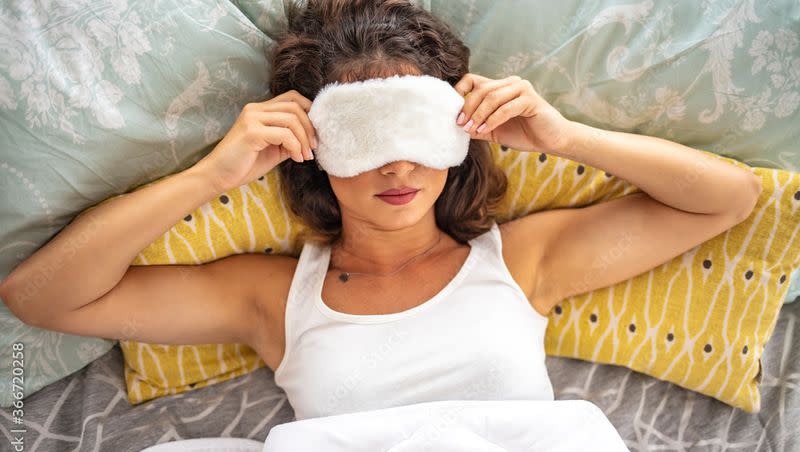Why everyone should wear an eye mask to bed

Whether it be because of a hallway light streaming in through the crack under the door, a television left on or a brighter night sky, bedrooms are rarely as dark as they should be.
Any light making it into our retinas at night can harm our health and ability to function the next day, according to The Washington Post.
The solution? Eye masks.
Viviana Greco, a researcher in psychology and neuroscience and author of a journal article on the importance of eye masks for Sleep, told The Washington Post that wearing an eye mask to sleep is “very basic and simple. At the same time, it can have huge benefits.”
What does research say about light exposure at night?
Here are little-known facts about why light exposure at night can be harmful:
In older individuals, light exposure at night is associated with higher rates of diabetes, hypertension and obesity, according to a study in the journal Sleep.
Less time is spent in slow wave and rapid eye movement during sleep, critical stages for cognitive function, according to an article in PNAS.
There is an increased insulin resistance the following morning, according to another PNAS article.
With light exposure, the heart rate stays high the entire night, the same PNAS study said. High heart rates are connected to experiencing lower sleep quality and an increased risk of cardiovascular disease, per the Sleep Foundation.
Moderate levels of light exposure in the hours before waking up causes more sleep disturbances, according to a study published in Sleep Medicine.
What does research say about eye masks?
Here are some ways that eye masks can benefit you:
Wearing an eye mask (and ear plugs) improved sleep quality of hospital patients sleeping next to blinking lights and whirring noises, according to one journal article.
Eye masks improve quality and duration of sleep for pregnant women compared to those given a pamphlet on how to sleep better, according to Sleep.
Wearing an eye mask at night improves memory and alertness the next morning, Sleep reported.
Phyllis Zee, a neurologist and director of the Center for Circadian and Sleep Medicine at Northwestern University’s Feinberg School of Medicine, found light at night to be less detrimental for healthy individuals, according to The Washington Post.
4 ways to manage light at night
For some individuals, it may be difficult to sleep in a completely dark environment due to things beyond their control. However, including eye masks, Greco and Zee shared a few tips with The Washington Post that will likely work for most people.
1. Get an eye mask
Look for an eye mask with an elastic band for adjustment. Fluffier masks tend to be soft and comfortable. If wanted, one can also get earplugs, Greco said.
2. Make your bedroom darker
Try blackout curtains or blinds, switch off or cover lights, and hide blue light, recommends Zee.
3. Put away electronic devices
Avoid notifications and distractions in order to help train yourself to learn “this is your time for sleep and just try to go to sleep,” said Greco.
4. Get light during the day
To offset detrimental effects of light at night, try getting more light during the day to improve sleep, Zee said.

